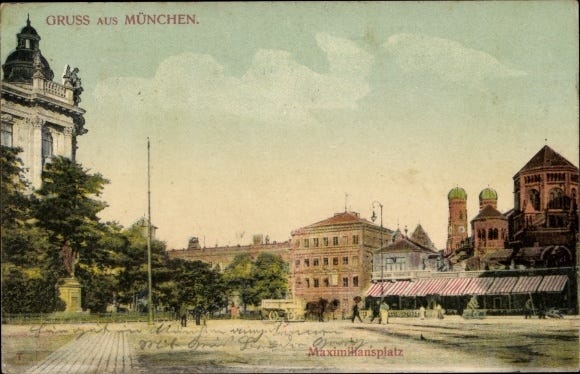In White Rose History, Volume II, this chapter is subtitled For serious readers only. However, I am not labeling it as such in this podcast because of its importance in understanding both the life of Josef Söhngen and Professor Kurt Huber, as well as the difficulty of discerning who was what.
Were these two men appropriately defined as dissidents? The Gestapo thought so. Our 20-20 hindsight can cause us to look askew at their lives. What do you think?
White Rose History, Volume II, pages 33-37.
Notes and references
Some (but not all) of the material may be repeated in subsequent chapters. This supplement consolidates information that makes both Söhngen and Huber difficult to understand.
Both Jürgen Wittenstein and Inge Scholl could also be considered enigmatic people, but neither contributed a whit to White Rose life.
The monument to the victims [Opfer] of National Socialism is located directly at that complicated Brienner Str. / Maximiliansplatz intersection.
The “Söhngen” bookstore still existed as of 2004, but it is now located at Türken Str. 30. It is currently called Buchhandlung L. Werner Architektur, Design, Kunst.
Information about directions is primarily documented by personal experience – driving (or trying to drive) those streets long before I knew there was a White Rose. And yes, I’ve gotten trapped and been unable to exit or turn where needed!
Information about location of the Bodega: Baedeker’s Germany: A Handbook for Railway Travelers and Motorists, dated 1936. Maffei Str. 4 is still a restaurant, but an upscale place, and not the cheap Italian “wine restaurant” of the 1940s.
Baedeker (Munich II map) is also the source for information about location of Braunes Haus, Führerbau, and Verwaltungsbau der NSDAP.
Information about location of the Hugendubel Book Store comes from 2/20/43 report filed by Agent Schmauβ regarding Hans Scholl’s activities, because White Rose targeted that particular store during one of the graffiti campaigns.
In the 2001 interview with Wittenstein, he expressly stated that Hans Scholl et al did not attend his literary soirees.
Baedeker, Karl. Germany: A Handbook for Railway Travellers and Motorists. New York: Chas. Scribner’s Sons, 1936. Original German version was published in Leipzig by Karl Baedeker, Publisher.
“Buchhandlung L. Werner in neuen Räumen.” August 27, 1953. Retrieved from www.muenchen.de/Rathaus/dir/stadtarchiv/chronik/81265/1953.html.
“Directory.” The online directory of the Pinakothek. Retrieved from www.pinakothek.de/kunstareal/galerien/galerien.pdf.
Dr. Jürgen (George J.) Wittenstein and his wife Christel Bejenke, California. January 2001. Three-day interview at their home (with numerous telephone conversations before and after). I issued a written report of this interview, and Dr. Wittenstein signed off on it. I entered every correction he made to the Protokol.
Wittenstein correspondence: May 28, 2000; December 15, 2001; multiple September 2003.
Zentrumspartei. “Geschichte.” Retrieved from www.zentrumspartei.de/html/ geschichte.html.
Ziegler, Armin. Jürgen Wittenstein und die Geschichte der ‘Weiβe Rose’: Ein Beitrag zur ‘Weiβe Rose’ Forschung. Schönaich: Self-published, 2004.
Third White Rose Trial. Initial interrogation of Josef Söhngen on 3/16/43; Söhngen’s post-war narrative; 4/27/43 order to transfer Söhngen, Geyer, Dohrn, and Eickemeyer to investigative custody; 5/24/1943 letter from Söhngen’s attorney requesting his release; 7/13/43 verdict with reasons; 4/14/1943 report by Gestapo about Söhngen; July 7, 1943 letter from Captain Manfred Schwarz to the Special Court in Munich on behalf of Josef Söhngen.
ZC13267, Volume 1, part 1. 2/20/1943 report filed by Agent Schmauβ regarding Hans Scholl's activities.
As always, should additional information become available that sheds new light on the person of Josef Söhngen, it will be included in a future update.
Postscript (2024): The Salvatorplatz location of Hugendubel bookstore was closed about ten years ago. The Marienplatz location still exists.
Hugendubel got into some pretty hot water around that time for ‘filtering out’ LGBTQ+ and “Communist” publications from its online store, along with items critical of the Catholic Church. Public pressure made the Hugendubel family and board of directors reinstate the filtered items.
Podcast © 2024 Denise Elaine Heap. White Rose History, Volume II, Chapter 3 (supplement), © 2002 Denise Elaine Heap and Exclamation! Publishers. Please contact us for permission to quote.
This podcast is a project of WHY THIS MATTERS, a newsletter of Center for White Rose Studies, that explores the reasons that voices silenced more than eighty years ago still speak to us today.
To order digital version of White Rose History, Volume II, click here. Digital version of White Rose History, Volume I is available here.












